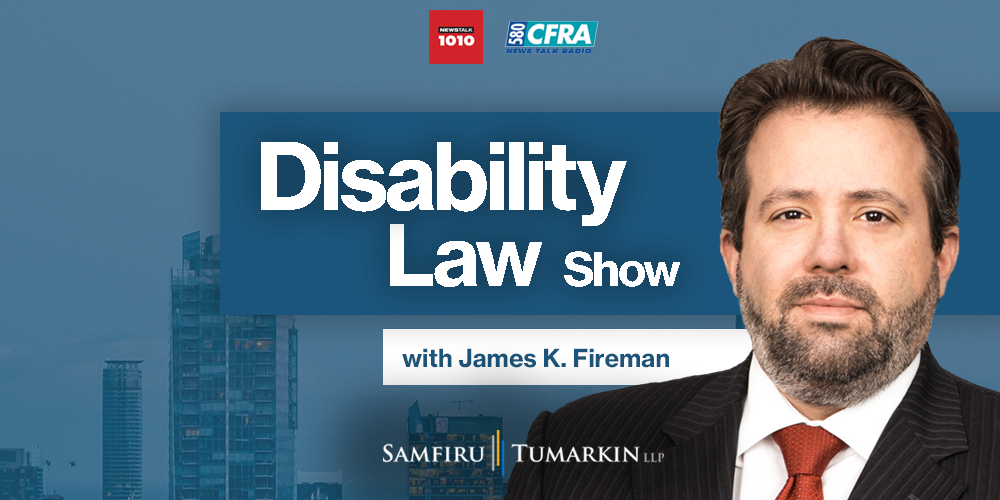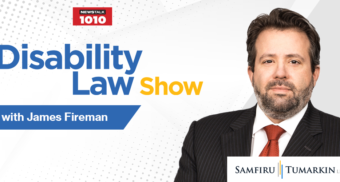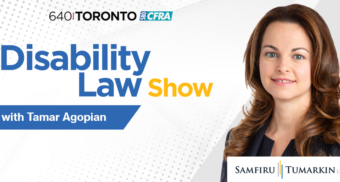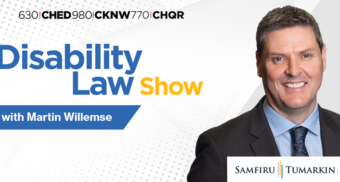Disability Law Show Bell Radio – S4 E06

Episode Summary
Discover your rights and the truth about insurance companies and long-term disability claims on Season 4 Episode 06 of the Disability Law Show on Newstalk 1010 in Toronto.
Listen below to James Fireman, and Tamar Agopian, Toronto disability lawyers at Samfiru Tumarkin LLP, who guide you through the proper steps to take when your insurance provider cuts off your long-term disability or denies your insurance claim. Find out how a disability lawyer in Ontario can help you secure proper compensation.
Listen to the Episode
Episode Notes
I’ve had chronic pain for years but there doesn’t seem to be a reason for why despite various tests and specialist appointments. I was on LTD for 2 years but then my benefits were cut off. What can I do?
It is important for claimants to remember that a diagnosis is not necessary for receiving disability benefits, but solely the support from treating doctors that a claimant is unable to work due to debilitating symptoms. This is common for many individuals who are unable to work but are still trying to determine a diagnosis. Insurance companies cannot cut a claimant’s benefits off due to a lack of diagnosis.
What is the difference between individual disability policies and group disability policies?
Group disability policies are set up by an employer with an insurance company and in contrast, individual disability coverage is paid into by the individuals themselves. Individual disability policies can have their own provisions and clauses that group policies do not; such as a lack of change in definition in order to qualify for disability coverage.
I’ve been on disability for 3 years. My wife and I are thinking about selling our house. If we do sell our home, does this count as income?
In every disability policy, there are provisions that state individuals’ benefits might be impacted by other sources of income, such as WSIB, CPPD, etc. There are also terms regarding other forms of income such as other business ventures. Selling a house will typically not count towards a source of income as a claimant is not working towards that income unless an individual is flipping real estate and selling homes in that manner. Passive income should not affect disability benefits.
If a person who is getting disability benefits feels like their insurance company is doing surveillance on them, should they ask the insurer about it?
Insurance companies that use surveillance in order to deny or cut off a claimant’s benefits have to be transparent about the fact that they have used this information as leverage. Claimants who have nothing to hide, however, should be wary of pushing the insurer on surveillance as it should not impact their ability to receive benefits. In some situations, the claimant’s disability might be affected by surveillance. If surveillance is affecting a claimant’s health and wellbeing they are within their rights to make their concerns known.
My benefits were cut off because the insurance company is claiming I didn’t attend two rehab sessions they set up for me. There were health and family reasons for why I needed to cancel these appointments and I rescheduled them immediately. My employer is now asking when I’m coming back to work.
Claimants who are on long-term disability benefits are required to receive reasonable treatment and attend regular treatments. Claimants who have missed occasional sessions for legitimate reasons should not have their benefits cut off by the insurance company; it is not justified. Employers are typically notified when an employee has had their benefits cut off as most claimants are receiving benefits through a group policy. It is important for claimants after beginning a legal claim to speak to their disability lawyer about their employment situation so that legal representation can communicate the details of the situation with their employer.
When disability benefits are approved past the 2-year mark, is it more likely the insurance company will keep paying benefits until age 65?
Unfortunately, many claimants have their benefits cut off even after they have passed the two-year “any occupation” mark, particularly if a claimant begins disability benefits at a young age. Claimants will likely have to keep giving ongoing medical updates to their insurance adjuster even if their medical team has stated they are unlikely to be able to return to work in the near future. Some claimants however are put on “long duration” in which claimants are not actively being adjudicated by the insurance company and will likely be on the receiving end of occasional requests from the insurance company.
LEARN MORE
Common reasons for LTD denials
If LTD paid for an independent medical review and a specific therapy is recommended is LTD responsible for funding the therapy?
Generally speaking, the insurance company will be responsible to pay for recommended treatment particularly if a claimant does not have additional coverage. While the insurer does not have to cover these treatments, they typically do in order to pressure claimants to be able to return to work.
LEARN MORE
Independent medical assessments and long-term disability




